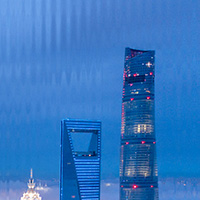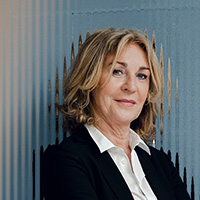
Michael Bodziner
Principal, Co-Chief Human Resources Officer
Gensler

Gensler, the world’s largest architectural and design firm, is known for having a robust corporate culture. Michael Bodziner, Principal and Co-Chief Human Resources Officer at Gensler, emphasizes their approach, stating, “People are our greatest asset, and our people-first philosophy underscores our firm's commitment to nurturing the professional and personal development of every team member so they can drive our firm's success.”
Michael's journey with Gensler began 39 years ago as a college intern. Reflecting on his tenure, he shares, “I bleed Gensler red – our brand color.” Initially joining as a design practitioner, Michael transitioned into human resources eleven years ago, culminating in his current leadership role. He attributes his long-standing commitment to the firm’s distinct vision, abundant opportunities, and collaborative culture.
It’s vitally important to us that our people understand and integrate into our strong, unique culture.”
- Michael Bodziner
Principal, Co-Chief Human Resources Officer, Gensler
However, the onset of the pandemic and the transition to remote work across the firm’s 57 global offices led to unforeseen challenges in maintaining their culture, particularly among new hires. In response, Gensler has gradually implemented a five-day, return-to-office (RTO) policy to rejuvenate its culture. Here, Michael shares insights into Gensler’s cultural ethos, their RTO strategy, and the significant impact this is having on their organizational success.
Gensler's Organizational Culture
Founded by Art Gensler in 1965, Gensler has maintained the culture he envisioned, focusing on relationships, inclusivity, and collaboration. Michael notes, “As we've grown and expanded our services and our reach, the culture has adapted, but the essential DNA of the culture from when the firm started still very much exists.”
A key element among the organization’s ten guiding principles is its relationship-based culture, where building internal networks is a top priority for new employees. Additionally, Gensler is strongly committed to diversity, equity, and inclusion, believing that diversity and belonging enhance creativity. The firm also prioritizes a highly collaborative culture and has implemented an open-door policy, ensuring that every employee has access to all executives within the firm.
We believe that when we bring people together on teams with diverse backgrounds and points of view, our design solutions are much more innovative for the communities we serve.”
- Michael Bodziner
Gensler aims to hire individuals who will enhance their culture; however, during and after the pandemic, the firm did not anticipate the extent to which remote work environments would impact new hires' understanding and immersion into their strong corporate culture. Since 2020, the firm has onboarded more than half of its 6,000 employees. Michael emphasizes, “So much of our culture is realized in person… That underscored even more strongly why we believe in getting people back in the office full time.”
The 5-Day RTO Policy
The return-to-office policy was implemented gradually, beginning with leadership to set an example for the rest of the organization. Initially, leaders were required to be in the office two days per week, as Michael notes, “We need leaders to be connecting with each other in person.” Over time, this requirement expanded to include all employees, eventually reaching a five-day, in-office schedule.
We believe that creativity and innovation are better realized when teams are working and interacting in the same physical space. We see a difference when our people are in person and learning from each other.”
Beyond the mandate, Gensler has consistently invested in bringing employees from different offices together, reinforcing their culture of connectivity and relationship-building. They routinely host retreats for various groups, as well as organizing an annual “Super Meeting,” where 400 employees are invited to connect with colleagues from around the world.
The firm believes that the more employees get to know their colleagues in other offices, the more they can access talent and resources that may not be available in their immediate network. Michael emphasizes this point: “People have asked us, ‘How do you afford to bring people together several times a year for off-site meetings where there's great expense involved? And our response is ‘How can you afford not to?’ Because the benefit is so obvious to us.”
Making the Office a Destination, Not an Obligation
Michael highlights that everyone works differently, and productivity means something different for each individual. The traditional office structure simply is no longer effective. He adds that employees are seeking the traditional benefits of the office, such as technology, mentorship, and socialization, but they also desire elements they became accustomed to at home, like privacy, acoustic control, and fresh air.
Only about 40% of workplaces have been redesigned post-pandemic. This means that people are returning to the same environment, even though the way they want and need to work has changed dramatically.”
Gensler has made a concerted effort to redesign their offices to meet the evolving needs of employees, while simultaneously fostering a culture of collaboration, inclusivity, and sustainability. They are doing this by providing more “work points” than employees, allowing for flexibility and choice in how they work throughout the day. Michael notes, “Abundance is really important. Having enough choices for people to come in every day and decide how they want to work.”
Their new San Francisco office exemplifies this approach with approximately 400 work points to ensure inclusivity and accessibility. It features diverse spaces such as “The Exchange” for those who prefer a coffee shop atmosphere, “The Hall” to inspire connectivity with group desks and team zones, “The Lodge” with a living room ambiance, “The Solarium” filled with natural light, and “The Vault” as a quiet space for deep focus, among others. Additionally, the office offers seating in over a dozen postures and incorporates green plants throughout to enhance air quality.
Gensler has put tremendous resources into their design, but Michael emphasizes that other organizations can make improvements at any scale. He advises, “Think of your office as a destination and not an obligation. What can you create? What can you foster? What can you renovate? How can you create it as a magnet for them to want to go to?”
Supporting Employees Through Change
Gensler acknowledges that the return-to-office can be a significant change for many. So, in addition to refining the office design, Gensler offers programs and benefits to help staff reacclimate, and they also offer flexibility to accommodate employees’ personal needs when necessary. Michael says, “HR at Gensler begins with the employee experience, and we're very committed to understanding our people on an individual basis and what it is that they're looking for in their relationship with Gensler.”
It's really important that every organization understands how their decisions are going to impact their people.”
Gensler believes that when employees fully integrate into the culture, they are more likely to succeed and remain with the firm longer, thereby reducing turnover. To facilitate this, new employees participate in a “Thrive” program to deepen their understanding of the company culture.
Gensler also ensures that each team member has a network of advocates to support their career journey at the firm, which is especially crucial as employees transition back to the office. They also provide mental health resources, including free counseling sessions, to assist those who may experience an emotional transition when returning to the office full-time. For those needing assistance with childcare or eldercare, Gensler offers additional support.
To prevent unconscious bias and ensure inclusivity in their return-to-office plans, Gensler has a global race and diversity committee in each region, along with DEI committees in every office. Additionally, numerous Employee Resource Groups (ERGs) are available to help employees connect with colleagues, fostering a sense of belonging and addressing diverse needs.
The Impact of Culture on Client Experience
Michael highlighted the challenge HR leaders face in balancing employee preferences for remote work with the needs of the business. While it is not possible to please everyone, he emphasized that Gensler's focus on human connection not only enriches employees' work experiences but also significantly enhances the client experience.
He posed a critical question: “How do your firm's culture and values influence the decisions you're making that have the largest influence on your people showing up for work every day? We believe that great design and creativity come from people being together.”
Michael stated, “I can tell you that every day I see the benefits of bringing our people together in person.” He added that when employees are passionate about their work and feel their careers are advancing, it creates a 'happy energy' that fuels innovation and results in better design solutions, underscoring the importance of investing in a strong, people-centric culture.
Michael Bodziner is the Principal, Co-Chief Human Resources Officer at Gensler and a Governing Body Member of the San Francisco CHRO Community.
To connect with like-minded HR leaders and participate in discussions on CHROs’ mission critical priorities, join your local CHRO community. If you are already a member, sign in to our app to register for your community’s upcoming gatherings.
Special thanks to Michael Bodziner and Gensler.
By CHROs, For CHROs®
Join the conversation with peers in your local CHRO community.





